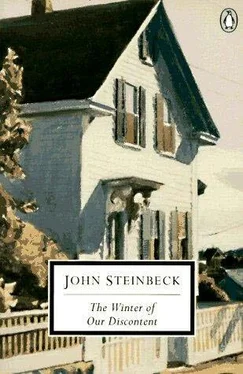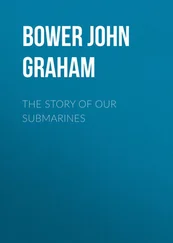A single unshaded light hung from a roof beam. The attic is floored with hand-hewn pine planks twenty inches wide and two inches thick, ample support for the neat stacks of trunks and boxes, of paper-wrapped lamps and vases and all manner of exiled finery. And the light glowed softly on the generations of books in open bookcases—all clean and dustless. My Mary is a stern and uncompromising dust harrier and she is neat as a top sergeant. The books are arranged by size and color.
Allen rested his forehead on the top of a bookcase and glared down at the books. His right hand was on the pommel of the Knight Templar sword, point downward like a cane.
“You make a symbolic picture, my son. Call it ‘Youth, War, and Learning.’ ”
“I want to ask you—you said there was books to look up stuff.”
“What kind of stuff?”
“Patriotic jazz, for the essay.”
“I see. Patriotic jazz. How’s this for beat? ‘Is life so dear or peace so sweet as to be purchased at the price of chains and slavery? Forbid it, Almighty God! I know not what course others may take, but as for me, give me liberty or give me death!’ [23] Is life so dear… give me death: From a speech by Patrick Henry (1736-99) delivered before the Virginia Convention on March 23, 1775.
”
“Great! That’s the berries.”
“Sure is. There were giants on the earth in those days.”
“I wisht I lived then. Pirate ships. Oh boy! Bang-bang! Strike your colors! Pots of gold and ladies in silk dresses and jewels. I sure wisht I lived then. Some of our folks done—did it. You said so yourself.”
“Kind of genteel piracy—they called them privateers. I guess it wasn’t as sweet as it sounds from a distance. Salt beef and biscuit. There was scurvy on the earth in those days too.”
“I wouldn’t mind that. I’d get the gold and bring it home. I guess they won’t let you do it any more.”
“No—it’s bigger and better organized now. They call it diplomacy.”
“There’s a boy in our school that won two television prizes—fifty dollars and two hundred dollars. How’s that?”
“He must be smart.”
“Him? Course not. It’s a trick, he says. You got to learn the trick and then you get a gimmick.”
“Gimmick?”
“Sure—like you’re a cripple or you support your old mother raising frogs. That gives you audience interest so they choose you. He’s got a magazine with every contest in the whole country in it. Can I get one of those magazines, Pop?”
“Well, piracy is out, but I guess the impulse lingers.”
“How do you mean?”
“Something for nothing. Wealth without effort.”
“Can I get that magazine?”
“I thought such things were in disrepute since the payola scandals.” [24] payola scandals: Although record companies had for decades paid radio stations to play their songs, payola became widespread in the 1950s with the burgeoning popularity of rock ’n’ roll and single 45-RPM records; in November 1959, Congress held hearings on payola, and in 1960 amended the Federal Communications Act to outlaw under-the-table payments.
“Hell, no. I mean no, sir. They just changed it around a little. I’d sure like to cut in on some of that loot.”
“It is loot, isn’t it?”
“It’s all dough, no matter how you get it.”
“I don’t believe that. It doesn’t hurt the money to get it that way but it hurts the one who gets it.”
“I don’t see how. It’s not against the law. Why, some of the biggest people in this country—”
“Charles, my son, my son.” [25] Charles, my son, my son: As John Ditsky notes, Steinbeck converts “the biblical into the secular woe by means of a reference to the unfortunate Van Doren.”
“How do you mean, Charles?”
“Do you have to be rich, Allen? Do you have to?”
“Do you think I like to live without no motorbike? Must be twenty kids with motorbikes. And how you think it is if your family hasn’t even got a car, leave alone no television?”
“I’m deeply shocked.”
“You don’t know how it is, Dad. One day in class I did a theme how my great-granddad was a whaling captain.”
“He was.”
“Whole class bust out laughing. Know what they call me? Whaley. How’d you like that?”
“Pretty bad.”
“It wouldn’t be so bad if you were a lawyer or in a bank or like that. Know what I’m going to do with the first chunk of loot I win?”
“No, what?”
“I’m going to buy you an automobile so you won’t feel so lousy when other people all got one.”
I said, “Thank you, Allen.” My throat was dry.
“Oh, that’s all right. I can’t get a license yet anyway.”
“You’ll find all the great speeches of our nation in that case, Allen. I hope you’ll read some of them.”
“I will. I need to.”
“You surely do. Good hunting.” I went quietly down the stairs and moistened my lips as I went. And Allen was right. I felt lousy.
When I sat down in my big chair under the reading light, Mary brought the paper to me.
“What a comfort you are, wiggles.”
“That suit looks real nice.”
“You’re a good loser and a good cook.”
“The tie matches your eyes.”
“You’re up to something. I can tell. I’ll trade you a secret for a secret.”
“But I don’t have one,” she said.
“Make one up!”
“I can’t. Come on, Ethan, tell me.”
“Any eary children listening in?”
“No.”
“Well, Margie Young-Hunt came in today. Out of coffee, so she said. I think she’s carrying a torch for me.”
“Come on, tell.”
“Well, we were talking about the fortune and I said it would be interesting to do it again and see if it was the same.”
“You didn’t!”
“I did so. And she said it would be interesting.”
“But you don’t like things like that.”
“I do when they’re good.”
“Think she’ll do it tonight?”
“If you care to offer me a penny for my thoughts, I think that’s why she’s coming.”
“Oh, no! I asked her.”
“After she set you up for it.”
“You don’t like her.”
“On the contrary—I’m beginning to like her very much, and to respect her.”
“I wish I could tell when you’re joking.”
Ellen came in then quietly so that you couldn’t tell whether she had been listening but I suspect she had. Ellen is a girl-girl-girl and thirteen to boot, sweet and sad, gay and delicate, sickly when she needs it. She is in that stage like dough beginning to set. She may be pretty, or not. She is a leaner, leans on me, breathes on me too, but her breath is sweet like a cow’s breath. She’s a toucher, too.
Ellen leaned on the arm of my chair and her thin little shoulder touched mine. She ran one pink finger down my coat sleeve and onto the hairs on my wrist and it tickled. The blond hairs on her arm shone like gold dust under the lamp. A devious one, she is, but then I guess all girl-girl-girls are.
“Nail polish,” I said.
“Mama lets me if it’s only pink. Your nails are rough.”
“Aren’t they?”
“But they’re clean.”
“I scrubbed them.”
“I hate dirty nails like Allen’s.”
“Maybe you just hate Allen lock, stock, and bobtail.”
“I do.”
“Good for you. Why don’t you kill him?”
“You’re silly.” She crawled her fingers behind my ear. She’s probably making some boy kids very nervous already.
“I hear you are working on your essay.”
“Stinker told you.”
“Is it good?”
“Oh, yes! Very good. I’ll let you read it when it’s done.”
“Honored. I see you’re dressed for the occasion.”
Читать дальше











